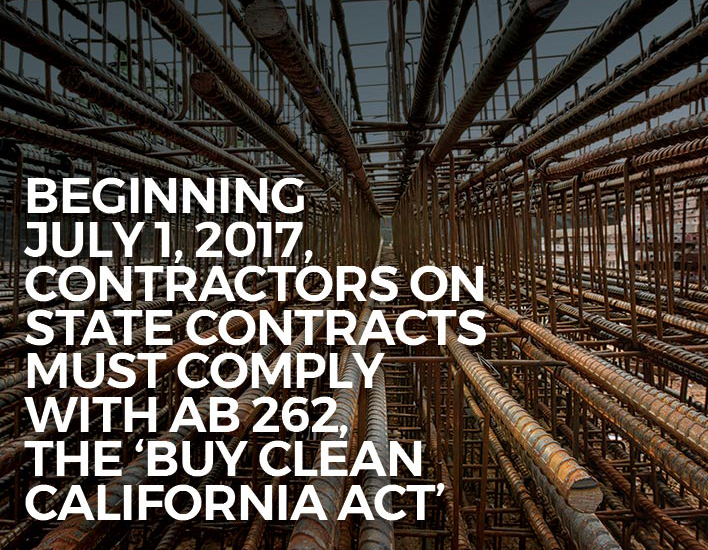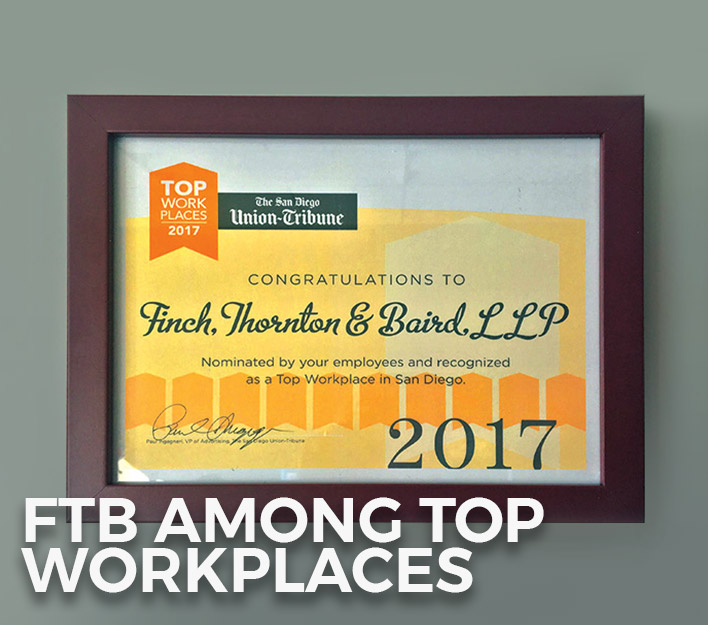By: Jeffrey B. Baird, Esq. of Finch, Thornton & Baird, LLP.
On October 15, 2017, California Governor Edmund G. Brown Jr. signed into law Assembly Bill 262 (“AB 262”) – a law that creates mandatory labeling requirements for eligible construction materials used on state contracts to ensure the materials comply with the maximum global warming potential levels established by state.
Under AB 262, to be enacted as Public Contract Code section 3500, successful bidders on state contracts “shall not install any eligible materials on the project until the bidder submits a facility-specific environmental product declaration for that material.” (Pub. Contract Code, § 3503, subd. (c).) As written, the law applies to successful bidders on state projects, but subcontractors supplying and/or installing eligible materials will also be responsible for ensuring that the required EPD labels are submitted and approved.
Accordingly, any party supplying or installing eligible materials on state contracts after July 1, 2019, must ensure that the eligible materials are procured from a facility that will provide an EPD label to certify that the life cycle global warming potential of the eligible materials is less than, or equal to, the maximum value of global warming potential established by the state for each category of eligible materials.
WHAT CONTRACTS DOES AB 262 APPLY TO?
AB 262 applies only to contracts entered into on or after July 1, 2019.
AB 262 applies to contracts with the following awarding authorities:
- state agencies;
- the Regents of the University of California; and
- the Trustees of the California State University.
WHAT DOES AB 262 REQUIRE?
By January 1, 2019, the Department of General Services must establish and publish the maximum acceptable global warming potential value for each category of eligible materials in the State Contracting Manual.
The state awarding authority must include a specification that sets the global warming potential for each eligible material specified for the project. The awarding authority can set a global warming potential value that is below the maximum value established by the Department of General Services.
The awarding authority’s contract will require successful bidders to submit facility-specific EPD labels for each eligible material specified to demonstrate that the global warming potential value of such materials is less than, or equal to, the established maximum value.
The successful bidder may not install any eligible material until the facility-specific EPD label is submitted and approved.
HOW ARE “ELIGIBLE MATERIALS” DEFINED UNDER AB 262?
Eligible materials include:
- carbon steel rebar;
- flat glass;
- mineral wool board insulation; and
- structural steel.
WHAT IS A “FACILITY-SPECIFIC ENVIRONMENTAL PRODUCT DECLARATION” UNDER AB 262?
An EPD is a label that discloses the life cycle environmental performance of products using pre-determined parameters. The information is verified by an independent third party through a life cycle assessment.
AB 262 requires that EPD labels comply with ISO standard 14025 requirements for Type III labels, “or similarly robust life cycle assessment methods that have uniform standards in data collection consistent with ISO standard 14025, industry acceptance, and integrity, for each eligible material proposed to be used.”
Essentially, facilities that produce eligible materials will be audited by an independent third party to determine the life cycle global warming potential associated with the production of the eligible materials. Beginning July 1, 2019, eligible materials must come from a facility that can certify compliance with the Buy Clean California
Act with an EPD label to ensure the materials can be installed on state projects.
To take steps to get ready for AB 262, please contact P. Randolph Finch Jr., Esq., or Jeffrey B. Baird, Esq., of Finch, Thornton & Baird, LLP, at (858) 737-3100. For a PDF of this article, click here.
DISCLAIMER: This new law advisory is a publication of Finch, Thornton & Baird, LLP, for the purpose of providing information relating to recent legal developments. It is not intended, nor should it be used, as a substitute for specific legal advice, and it does not create an attorney-client relationship.


